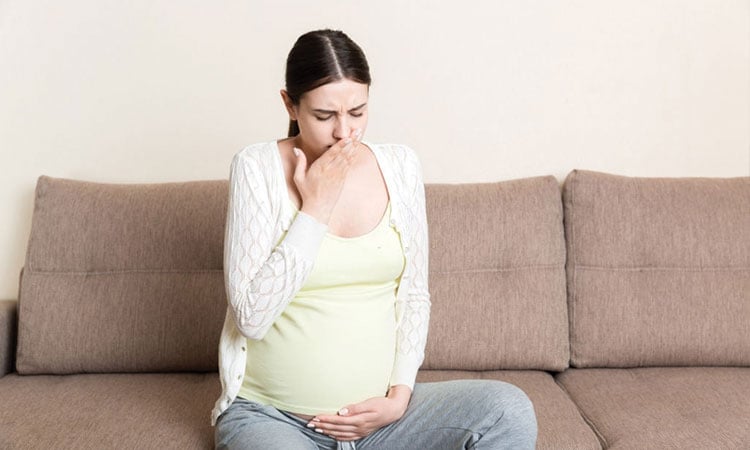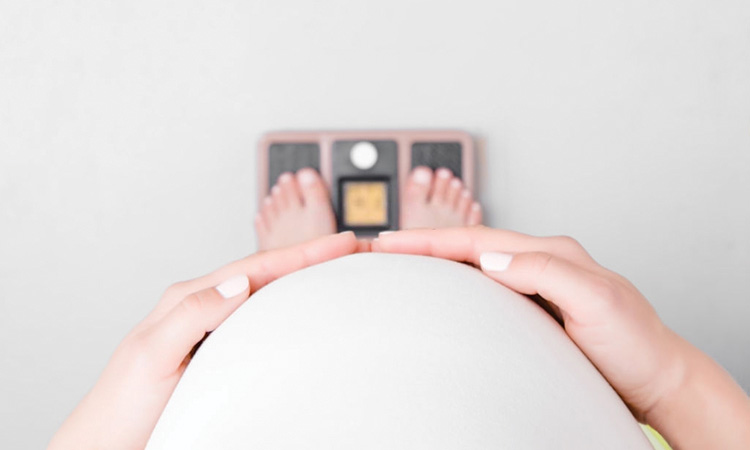Weight gain during pregnancy comes as a taken, weight loss during this time may appear strange to some. Often, losing weight during pregnancy is a temporary condition that can be dealt with simple changes in lifestyle or diet. Nonetheless, losing weight during pregnancy is concerning and that’s why we are here to bust all the myths and give you possible reasons and solutions.
So, without wasting any more time, let’s dig in!
Is It Normal And Safe To Lose Weight While Pregnant?
While women may start gaining weight after the 4th month, some women face a significant weight loss during their pregnancy.
Losing some weight, especially during early pregnancy, may seem normal and safe for your baby. Infact losing weight during pregnancy may turn out to be fruitful for obese women whose BMI exceeds the normal level.
However, no matter what, a healthy diet is a prerequisite for pregnancy and you should not indulge in diets, no matter what your BMI is.
If weight loss happens for women with considerable BMI it should be followed by the subsequent weight regain as the pregnancy steps into the subsequent trimesters. This is because during pregnancy you need to have a balanced diet as missing out on nutrients can be harmful for your baby.
Loss of weight in the first trimester can be due to morning sickness that affects approx 70-80% of pregnant ladies in this trimester. There’s no negative impact on the baby’s health if you lose some pounds at this particular period.
Weight loss may become an issue if you find a significant drop in body weight, like 75 kg women falling to less than 55 kg. There oozes the need for contacting your health care provider as the loss may be subjected to poor fetal development, low content of the amniotic fluid, pregnancy-induced hypertension, or preeclampsia. All of these conditions can make your pregnancy complicated.
Calculate Due Date With LMP
Why Are You Losing Weight During Pregnancy? 11 Probable Reasons
While intentional weight loss is not recommended during pregnancy, if you do happen to lose considerable weight during pregnancy you need to consult your doctor who can analyse probable causes and suggest possible measures.
Here some of the causes that may lead to weight loss during pregnancy are-
1. Morning sickness

Pregnancy nausea or morning sickness is highly dominant in the first trimester. It can make you eat less causing loss of some weight. Occasional or mild to moderate sickness can be taken care of if you are taking healthy foods and a sink in few pounds is noticed.
The symptoms of morning sickness that are liable to occur owing to hormonal imbalance include nausea and vomiting, decreased appetite, sensitivity to odor, fatigue, etc. These symptoms subside by week 14, and then the gaining process may commence.
2. Hyperemesis gravidarum
When the morning sickness heightens to the next extreme level, it is known as hyperemesis gravidarum. In this condition, the women experience intensified symptoms such as severe nausea and vomiting. The condition may pose serious dehydration issues and substantial weight drop.
According to our panel gynaecologist Dr Ankita Patel Tayal, whereas nausea and vomiting of pregnancy (NVP) affect at least 75% of all pregnant women, Hyperemesis Gravidarum (HG) is the severe end of the clinical spectrum of NVP and can be associated with serious maternal and fetal morbidity, such as Wernicke’s encephalopathy, fetal growth restriction, and even maternal and fetal death.
HG is commonly defined as extreme nausea and vomiting accompanied by a weight loss to at least 5% below prepregnancy weight.
Every year more than 36,000 women are hospitalized in the US because of HG, as per the Studies and Researchers. Generally, HG sneaks in 4-6 weeks and heighten up with weeks 9-13. As the pregnancy kicks in weeks 14-20, most of the women may find ease, while some require care throughout the gestational period.
It can be curated with medications, infusion of intravenous fluid to retrace electrolytes and fluids, and several alternative therapies.
3. Exercising during pregnancy
Losing weight during pregnancy can also happen if you start to exercise daily and focus on eating healthy foods. Although keeping active during pregnancy is recommended largely, there are a few exercises that are not considered safe during pregnancy.
Similarly, healthy eating is great, but when pregnant you need a balance of nutrients and some extra calories to support your growing baby.
Related Reading: 12 Elements of A Healthy Pregnancy Daily Routine
4. Autoimmune disorders
Autoimmune disorders such as Graves disease may happen when the abnormalities in the immune system lead to the inflammation or aches in joints, kidneys, muscles, skin, heart, lungs, etc.
The abnormal growth of antibodies may hamper the fetus as these may penetrate the barriers and reach the placenta, thereby impacting the fetus. Pregnant women with such disorders may have possible organ damage, which may physically aggravate your health, thereby causing loss of weight. There may be other serious effects of losing weight during pregnancy too.
5. Gastrointestinal and digestive disorders

Gastrointestinal and digestive disorders affect your ingestion process, how the absorption of ingested food occurs in the body, and digestion of ingested food. Consequently, a pregnant lady may lose or gain weight. But most women with digestive disorders are known to losing weight during pregnancy without morning sickness as the food is not properly digested in the gut.
Some gastrointestinal complications, like nausea and vomiting, are common in 50-90% of pregnant women, which are mainly controlled by estrogen levels in the body. Vomiting may be severe enough to cause weight loss, electrolyte imbalance, and acid-base mobilizations.
6. Undiagnosed diabetes
Some of the common symptoms of diabetes are fatigue, polyuria, polydipsia, polyphagia, weight loss, dizziness, blurred vision, usual thirst, etc. People with diabetes have relatively low production of insulin ( a hormone that regulates blood glucose level). This thereby deprives the body’s cells and tissues from getting the required amount of glucose from the blood for energy production.
Thus to compensate for the loss, the body begins to use the reserved fat and glycogen for burning calories and producing energy for performing the vital functions of the body. This can lead to the decrement in overall body weight of the pregnant women. There you need to contact your doctor to get immediate treatment for your undiagnosed diabetes.
7. Hormonal imbalance
Hormonal imbalance is most frequently noticed in pregnant women. It is a biological process and can’t be controlled as it occurs naturally without any human intervention. Such imbalance may cause varying degrees of undesirable and unwanted symptoms like weight loss, fatigue, bad mood, irritability, anxiety, stress, etc.
The most prevalent symptoms of pregnancy are nausea and vomiting, which are caused owing to a hormone called Human Chorionic Gonadotrophic hormone (HCG). HCG is a hormone that is produced only during pregnancy. The main purpose of it is fetal nourishment by ensuring proper nutrition to the fetus and placenta and promote weight loss too.
8. Uncontrolled hyperthyroidism
Overactive thyroid or hyperthyroidism is a condition in which the thyroid gland produces the thyroxine hormone to a greater extent. This condition usually triggers and accelerates the metabolism of the body that may lead to unintentional weight loss during pregnancy or alter the normal rhythm of the heartbeat.
Thyroid hormone helps the body to perform various functions such as digestion, mental development, nourishment of muscles, normal function of heart and muscles, etc. If the thyroxine level lowers or escalates during pregnancy, it may cause serious problems.
If this condition is left untreated during pregnancy, then this may give rise to several perils such as Spontaneous abortion, stillbirths, and premature births. The symptoms of hyperthyroidism are anxiety, irritability, mood swings, nervousness, and sometimes weight loss during pregnancy, as it affects your proper digestion of the food in your gut.
9. Psychiatric disorders

The common and major symptoms of psychiatric disorders are anxiety and depression. About 20% of pregnant ladies are known to experience anxiety and mood swings during gestation; those women who have a history of psychiatric diseases are more vulnerable to such illness during pregnancy.
Depression may severely influence the mental health of the mother, and this may consequently exacerbate the body’s metabolism rate, thereby causing loss of weight of the pregnant mother.
10. Infections
Pregnant women are more liable to get several infections and complications throughout the gestational period. The infections that they are mostly exposed to are vaginal infections, uterine infections, HIV infections, etc.
Vaginal infections such as vaginal yeast infections and bacterial vaginosis during pregnancy seriously impact maternal health, including weight loss. Often, HIV infection is associated with wasting, a gradual and progressive loss of body weight (body mass).
Although the loss of weight during early pregnancies is considered normal, one should go for immediate treatment as these may be the indications for certain risky infections within the body, and they should be diagnosed as early as possible.
11. Other causes of weight loss
If the sudden decrement in body weight is not a consequence of morning sickness, then you must be under the constant supervision of your health care providers.
Some of the probable causes of weight loss during gestation are – endocrine imbalance, ingestion disorders, , cancers, chronic ailments, infections and injuries, gastrointestinal diseases, neurological dysfunctions, etc.
Unless there’s a need, just in the case of obese women, intended weight loss isn’t recommended by the doctors. Considerable weight drop for obese women may deplete the risk of gestational diabetes, preeclampsia, having an overweight baby, and emergency c – section.
Conclusion
In general, from the above point of view, it can be concluded that certain loss of body weight while pregnant may not increase the threat. However, if such loss extravagates with no succeeding regain, then that may pose hazards to you and your baby. Weight loss is mostly recommended for obese women to drop the risk of negative impacts on the baby’s health.
Dr Ankita Patel Tayal, MD OBGYN, states that according to the Centers for Disease Control and Prevention (CDC), the amount of weight to gain during pregnancy depends in part on your weight before getting pregnant. For example, if you were underweight, it might be appropriate to gain between 28-40 pounds. If you were an average weight, a 25-35 pound gain might make sense. If you were overweight or obese, a smaller weight gain might work best for your pregnancy.
Thus, you should be cautious and must seek prenatal check-ups to track your daily health and also to have proper guidance regarding healthy weight loss and every issue linked with it.
FAQs
There are no certain causes associated with the women’s gestational weight gain or weight loss and the gender of a baby. As per the 68 million birth analysis by Kristen J.Navara, an endocrinologist at the University of Georgia, the weight gain of a woman is correlated with the birth of a male child.
Thus, the probability of giving birth to a female child escalates when the loss of weight is noticed. However, it is less likely to give birth to a boy as per the analysis. But if the gaining process is significant (exceed 60 lb), then such correlation and probability of male births go down.
Therefore, it’s not appropriate to rely solely on the procedure of weight loss( also weight gain) for predicting a baby’s sex or gender.
Losing weight is normal and safe during early pregnancies as morning sickness can be the prior cause for such. But if the loss pursues even you’ve reached the third trimester with no subsequent weight gain, then that may be alarming.
The prime symptoms of miscarriage are vaginal bleeding, abdominal cramps, and other symptoms include weight loss, nausea, and more. If you had nausea, vomiting, and breast tenderness before, and if any of these symptoms start vanishing, then that might be a sign of miscarriage.
Thus one cannot consider the loss of weight as a sign of miscarriage as this gives rise to ambiguity. So, one has to consult with her OBGYN or midwifery for the proper interpretation.
It’s not uncommon to lose some weight during early pregnancies, but if even after that, an unexplained weight loss in pregnancy of 1 kilo with every passing month is observed then that may be perilous, and you need to catch up with your doctor soon.
Excessive weight loss may become a worry as it may prove out to be fatal for your baby with several complications in delivery like pre-term birth, small size or large size baby, etc.
So one should worry about the loss of weight when you’ve already lost some weight in the first trimester but still, the loss persists even after subsequent trimesters.


